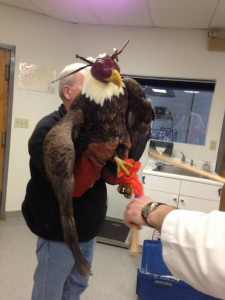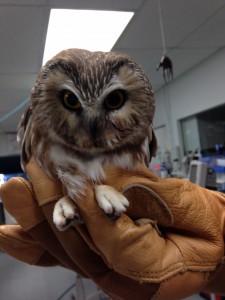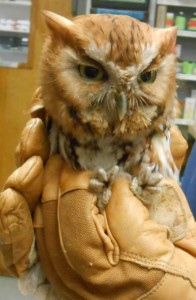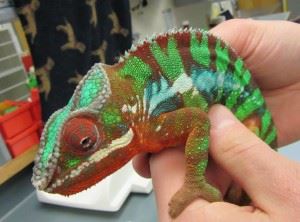How to Differentiate Your Veterinary Practice Through the Treatment of Wildlife and Exotic Animals.
- Category: Blogs
- Posted On:
- Written By: Brian Miller
Working as a receptionist at Liverpool Animal Health Center provides me with a unique opportunity to gain perspective that may not be as apparent within other departments of the hospital. Aside from witnessing the comings and goings of virtually every pet and owner that walks through our doors, I am also constantly answering phone calls. At least once a day, and usually more, I will receive a call from someone who believes that they are reaching one of the other local hospitals. This, in large part, is due to the fact that there are two other hospitals located on the same stretch of road that we are, and these offices each begin with the word “Liverpool.”
The mere fact that there are other offices within such close proximity to ours means that it is imperative to not only provide the best care possible, but also to make each experience rewarding and educational. It also means that we need to find a way to separate ourselves from our competition by providing services that allow us to rise above the rest. In these areas, LAHC excels, serving as one of the few offices in the Central New York region that treats wildlife patients and non-traditional (exotic) pets.
When Jean and Lenny Soprano founded Kindred Kingdoms Wildlife Rehabilitation Center in 1989, they were initially met with resistance when they set out to find a local veterinary practice that would treat wildlife animals that needed a doctor’s care. According to Ms. Soprano, “Even though practices used wildlife rehabilitators when their clients called about an injured or orphaned wildlife species, they would not treat the animal or allow their clients to bring them into their offices.” Fortunately for the injured patients and for the Soprano’s, Liverpool Animal Health Center was eager to help. Practice owner Dr. David Clegg, as well as the doctors that were here at the hospital when Kindred Kingdoms was founded, were really interested in helping out these wildlife patients. “It all started because there was a need, and we were able to fit that need,” according to Dr. Clegg.
In their early days, Kindred Kingdoms helped rehabilitate a seemingly endless variety of species. Now, they focus primarily on birds of prey (although they still care for baby bears in an enclosure that is completely devoid of human interaction.) This works well for our doctors and patients, because it ensures that rabies vector species are not coming into the hospital for care. When asked what species she has needed veterinary care for, Ms. Soprano lists: coopers hawks, sharp shinned hawks, redtails, rough-leggeds, kestrels, merlins, screech owls, barred owls, great horned owls, saw-whet owls, snow owls, turkey vultures, osprey and Bald Eagles. “LAHC provides us with complete diagnostic care, which includes x-rays, blood work, and eye exams,” says Ms. Soprano. “The radiographs ascertain what fractures are present, and whether or not the animal has been shot, swallowed fish hooks, or has any other foreign body internally. Blood analysis determines heavy metal toxicity, red and white blood cell counts, PCV etc. This allows us to choose the proper medication for the animal. A thorough eye exam may reveal retinal detachment, blood in the eye, and corneal or lens damage.” “The relationship is mutually beneficial,” says Dr. Clegg, “we help provide them with care for their rehab patients, and when they are out doing their demonstrations, when asked, they let people know that the animals are cared for by Liverpool Animal Health Center. This is some of the best marketing we can ever have. They are great people to work with.”



Currently, Dr. Marla Lender and Dr. Nicholas Wolfer are the two veterinarians at LAHC who care for the wildlife patients. “The number of cases rehabilitators handle is huge, and many of the animals they accept have terrible injuries or illnesses,” says Dr. Wolfer. He goes on to say that “In situations of toxicities, fractures, neurologic damage and eye damage, it often requires the facilities (laboratory, radiographs, etc.) and expertise of a veterinarian working in conjunction with the rehabilitator to determine an animal’s prognosis, and to guide treatment.” Dr. Lender adds, “Illness and injury among wild animals is frequently the result of indirect contact with humans. We commonly see animals that are injured by gunshot, traps, fishing hooks or lines, toxins, motor vehicles, electrical wires, and our pets. While it would be best to prevent these sorts of injuries, I do believe we have an obligation to take care of the world we live in and the creatures we share it with. Providing veterinary care to injured wild animals is one way in which veterinarians can do that.”
Dr. Wolfer and Dr. Lender not only see wildlife patients in conjunction with their regular case load, but also exotic pets as well. They are not the only doctors who have seen exotic patients within the practice, however. According to Dr. Clegg, Liverpool Animal Health Center has been attending to the needs of these patients from the time the hospital opened its doors, although “The volume, incidents, and frequency of visits is much greater now than it used to be.” When asked for the reason for this, Dr. Clegg says, “I think it is because we now have doctors who are very interested in and have further knowledge of the exotic world, which allows us to give proper care. Although our doctors are not specialists, we try to provide the best possible care we can.” He goes on to say, “All veterinarians are in the business to help animals, but treatment of exotic pets has gotten more specific and refined over the years. Long ago, most doctors would see exotic patients whereas now, it is done primarily by doctors who have an interest and passion in treating them. These doctors are now more educated, have better knowledge, and possess the ability to better care for these non-traditional companions.” This is illustrated by the fact that Dr. Wolfer and Dr. Lender both took elective courses and clinical rotations focused on exotics and wildlife at Cornell University. They also learned about treatment of exotics through other veterinarians in practice, clinical experience, written resources, and continuing education.
Both Dr. Wolfer and Dr. Lender feel that it is vital for our hospital to provide care for exotic pets. “They are an underserved group of patients, and in many ways, their owners are underserved as well,” states Dr. Wolfer. “They are often purchased on impulse, and the owners are given little or incorrect information on proper care. Consequently, the majority of the disorders we see are due primarily to poor husbandry conditions that could be easily avoided or corrected.” Much like the Soprano’s found difficulty in finding a practice that would assist with wildlife, owners of exotic pets often have difficulty finding a doctor that is willing to see their pet. Because of this, it puts these pets at a disadvantage. This is one of the driving forces behind Dr. Lender’s decision to treat exotic pets. “When I learned of the challenge people have in finding veterinary care for exotic pets and of the rampant misinformation people receive from pet stores, breeders, and the internet, I felt a responsibility to do my part to educate and assist them, with the goal of improving the quality of life of the animals.”

Stayed tuned for my next blog around how we work with government agency dogs in the area!
